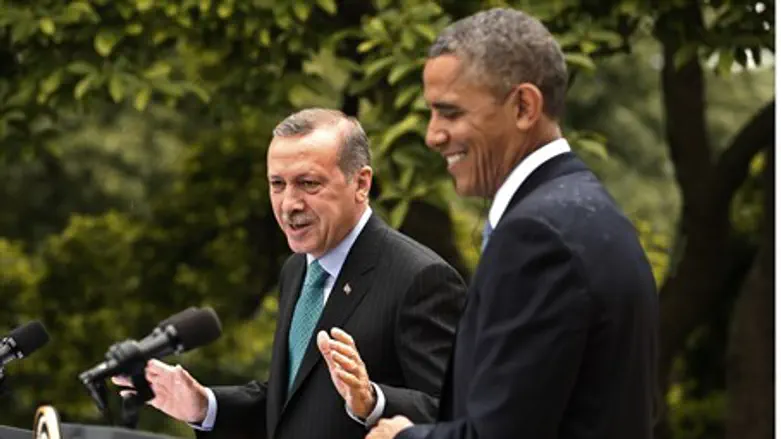
The United States and Turkey have agreed to work together to drive Islamic State (ISIS) jihadists from northern Syria, senior American officials said Monday, according to the AFP news agency.
The announcement came as Turkish Prime Minister Ahmet Davutoglu vowed to press ahead with parallel strikes against Kurdish militants.
The potentially game-changing accord with the U.S. was revealed as Turkey fuelled the growing anger of its Kurdish minority by shelling a Kurdish-held village in northern Syria while its warplanes continued to pound Kurdish targets in northern Iraq.
Referring to Islamic State by the acronym ISIL, a senior American official told AFP that Ankara and Washington aimed "to establish an ISIL-free zone and ensure greater security and stability along Turkey's border with Syria."
Details of the zone "remain to be worked out", the official, who asked not to be named, said during a visit by President Barack Obama to Ethiopia, while adding that "any joint military efforts will not include the imposition of a no-fly zone" -- a long standing Turkish demand.
It would however entail Turkey supporting the "partners on the ground" already fighting ISIS extremists.
But many question whether Turkey is more interested in limiting Kurdish capabilities in Syria and Iraq than tackling ISIS.
Davutoglu, meanwhile, said Turkey would press ahead with military operations against the outlawed Kurdistan Workers' Party (PKK) until the group disarmed.
"We will continue our fight until we obtain a certain result," he told ATV television, urging the Kurdish separatists, who have waged a decades-long insurgency in southeastern Turkey, to deliver on its 2013 promise to lay down arms.
State Department spokesman John Kirby reiterated that Turkey had a "right to defend itself" against the PKK, which the U.S. also labels a terrorist organization
At the same time, Kirby said the "fight against ISIL is not in cooperation with, coordination with or communication with the PKK. Our fight against ISIL is with 62 other nations in this coalition who are helping us go after these guys."
Turkey has called an extraordinary NATO meeting for Tuesday over its "anti-terror" offensive against the Kurdish rebels and ISIS.
French President Francois Hollande, in a telephone call Monday with Turkey's President Recep Tayyip Erdogan, "thanked his counterpart for the vigorous action against Daesh and for strengthening Turkey's engagement alongside the (anti-IS) coalition", his office said.
The French statement made no mention of the anti-Kurdish strikes, noted AFP.
The Syrian Kurdish People's Protection Units (YPG) -- which routed ISIS from the flashpoint Syrian town of Kobane early this year with the help of Western air strikes -- said Turkish tanks hit its positions and those of allied Arab rebels overnight in Zur Maghar village in Aleppo province, wounding four rebels and several villagers.
But Turkish officials denied the military was deliberately targeting Syrian Kurds and said it was responding to fire from the Syrian side of the border.
Davutoglu told a group of Turkish newspaper editors that Ankara's intervention in Iraq and Syria would "change the balance" in the region, but ruled out sending ground troops into Syria.
Turkey has given the United States the green light to use its Incirlik air base to attack ISIS after months of tough negotiations.
Davutoglu said Ankara's demands for a no-fly zone were addressed "to a certain extent", according to the Hurriyet daily.
"Air cover is important, the air protection for the Free Syrian Army and other moderate elements fighting Daesh," he said, according to AFP.
"If we will not send ground forces -- and that we will not do -- then certain elements that cooperate with us on the ground must be protected," Davutoglu added.
AFP contributed to this report.
